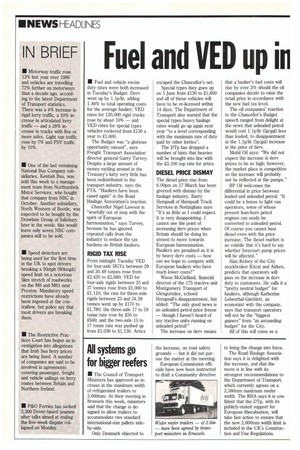Fuel and VED up in
Page 6

If you've noticed an error in this article please click here to report it so we can fix it.
• Fuel and vehicle excise duty rates were both increased in Tuesday's Budget. Dery went up by 1.1p/lit, adding 1.46% to total operating costs for the average haulier; VED rates for 120,000 rigid trucks rose by about 10% — and VED rates for special types vehicles rocketed from £130 a year to £1,600.
The Budget was "a glorious opportunity missed", says Freight Transport Association director general Garry Turvey. Despite a large amount of money rattling around in the Treasury's kitty very little has been redistributed to the transport industry, says the FTA. "Hauliers have been caned again" is the Road Haulage Association's reaction.
Chancellor Nigel Lawson is "woefully out of step with the spirit of European harmonisation," says Turvey, because he has ignored repeated calls from the industry to reduce the tax burdens on British hauliers.
RIGID TAX RISE
From midnight Tuesday VED for four-axle HGVs between 29 and 30.49 tonnes rose from 22,420 to £2,680; VED for four-axle rigids between 25 and 27 tonnes rose from 21,000 to 21,110; the rate for three-axle rigids between 23 and 24.39 tonnes went up by 2170 to 21,780; the three-axle 17 to 19 tonne rate rose by £50 to .2540; and the two-axle 15 to 17 tonne rate was pushed up from £1,030 to £1,130. Artics escaped the Chancellor's net.
Special types duty goes up on 1 June from £130 to 21,600 and all of these vehicles will have to be re-licensed within 14 days. The Department of Transport also warned that the special types heavy haulage rates would go up again next year "to a level corresponding with the maximum rate of duty paid by other lorries".
The DTp has dropped a number of hints that heavies will be brought into line with the £3,100 top rate for artics.
DIESEL PRICE DISMAY
The diesel price rise from 6.00pm on 17 March has been greeted with dismay by the haulage industry. Barry Hempsall of Hempsall Truck Services in Nottingham says: "It's as little as 1 could expect. It is very disappointing. I cannot see the point of increasing dery prices when Britain should be doing its utmost to move towards European harmonisation. Hauliers are penalised as it is by heavy dery costs — how can we hope to compete with European hauliers who have much lower costs?"
Wison McClelland, financial director of the 175 tractive unit Montgomery Transport of Glengortnley, echoed Hempsall's disappointment, but added: "The only good news is an unleaded petrol price freeze — though I haven't heard of any tractive units running on unleaded petrol!"
The increase on dery means that a haulier's fuel costs will rise by over 3% should the oil companies decide to raise the retail price in accordance with the new fuel tax level.
The oil companies' reaction to the Chancellor's Budget speech ranged from delight at the news that unleaded petrol would cost 1.1p/lit (5p/gal) less than leaded, to disappointment at the 1.1p/lit (5p/gal) increase in the price of derv.
Mobil Oil says: "We did not expect the increase in dery prices to be so high; however, the market place is competitive so the increase will probably not be reflected at the pumps."
BP Oil welcomes the differential in price between leaded and unleaded petrol: "It could be a bonus to light van operators, some of whose present lean-burn petrol engines can easily be converted to unleaded petrol. Of course you cannot beat diesel even with the price increase. The diesel market is so volatile that it's hard to say whether forecourt pump prices will be affected."
Alan Kelsey of the City stockbroker Kitcat and Aitken, predicts that operators will pass on the increase in dery duty to customers. He calls it a "pretty neutral budget" for hauliers, although Katherine Lebenthal-Gimblett, an economist with the company, says that transport operators will not be the "biggest gainers" from "an astounding budget" for the City.
All of this will come as a
































































































